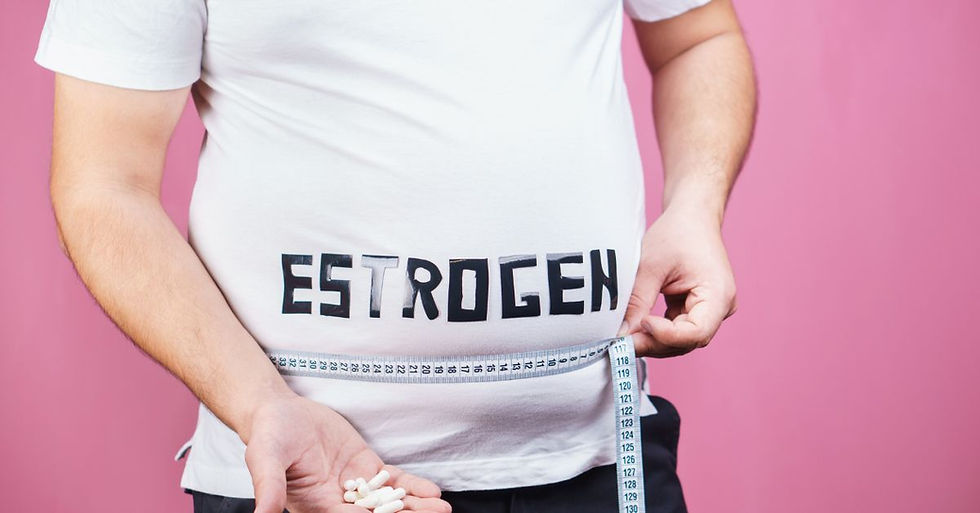You’ve probably been told you are gaining weight because you’re eating to much or not getting enough exercise, but did you know that your hormones are likely a big part of the problem. Here are some tips to help you stop hormonal weight gain.

What is hormonal weight gain?
We often think that we are gaining weight only because we are eating too much and not getting enough exercise. But in reality your hormones play a large role in weight gain.
You may not have made changes to the amount of exercise you get or to how many calories you consume, but are experiencing weight gain. It can be very frustrating.
Hormonal weight gain is caused by an imbalance of one or more hormones.
Which hormones are responsible?
Several hormones can be responsible for hormonal weight gain. Here are some of the most common:

Hypothyroidism
One of the purposes of your thyroid is to control metabolism, so it is no surprise that low thyroid hormones cause weight gain. If you are also experiencing fatigue, hair loss and cold sensitivity these are signs that your thyroid hormone levels are low.
High cortisol
Cortisol is known as the stress hormone because it is released when your body is under stress. It helps your body react to stressful situations by slowing your metabolism. It can also lead to cravings for sugary or high fat foods. High cortisol can also slow the production of testosterone which is beneficial to your metabolism.
Estrogen Dominance
Estrogen dominance refers to high levels of estrogen relative to other reproductive hormones. In females this is estrogen relative to progesterone levels. In males it is estrogen relative to testosterone levels. Estrogen dominance can lead to weight gain and other symptoms like fatigue or anxiety which can indirectly contribute to weight gain. It also increases the risk of blood sugar imbalances which can also lead to weight gain. Estrogen dominance also increases fat storage particularly around the belly and breasts which makes this weight gain even more dangerous.
Low Estrogen levels
On the flip side when estrogen levels drop during menopause or for other reasons it can also contribute to weight gain. Estradiol is the form of estrogen that is most prevalent during a female’s reproductive years. This hormone has an effect on food intake and on energy expenditure. When estradiol levels are low it can affect signals the body has for appetite and lead to insulin resistance and therefore weight /fat gain.
Low testosterone
Low testosterone contributes to weight gain in both men and women. Testosterone promotes muscle growth for both. Males have much higher levels of testosterone which means higher muscle mass. But females are also affected if they don’t have enough. Less muscle means a lower metabolism which leads to more fat storage.
It doesn’t help that excess belly fat can lead to even lower levels of testosterone, making fat loss even harder.
Insulin resistance
When things work normally, insulin helps move glucose from the blood to cells in your body that need it for energy, or in muscles. Insulin resistance occurs when your body doesn’t respond properly to insulin. Your body will keep making more insulin, but blood sugar remains high and more insulin is produced. The result can be prediabetes and type 2 diabetes.
Weight gain also occurs as your body can’t remove the blood glucose so it is stored as fat
Leptin resistance
Leptin is a hormone stored in body fat that controls satiety (feelings of fullness). When it’s working, if you’ve eaten enough, leptin acts on the brain to let it know that you are full. But when you have too much leptin (because of too much body fat) you can become leptin resistant. Your brain will no longer get the satiety signal so you might keep eating. It also causes your metabolism to slow down because it’s never getting the satiety signal.
What can you do about it
If you are gaining weight despite eating healthy and exercising, you should consider hormone imbalances. Your physician can order tests to see if there are imbalances. Saliva tests are the most accurate. Medication may be necessary in some very depleted cases but usually diet and lifestyle modifications are the first step. Here are some things you can start with:

My experience
I often have clients looking for weight loss solutions. They are frustrated that nothing seems to work. Most have hormone imbalances affecting multiple hormones. I’ve been able to help them by focusing on their hormones. My personalized plans have helped my clients stop hormonal weight gain.

How I can help
My custom weight loss plans focus on balancing hormones to achieve weight loss. We will discuss specific foods that help the liver and detoxification pathways to remove byproducts of hormones and reduce risk factors for cancers, metabolic disorders, and issues with metabolism and fat gains. Together, we’ll create a plan that will provide the changes you need to reverse the effects of imbalanced hormones.
Warm wishes,

Vicki Witt | Clinical Nutritionist | Holistic Coach | Reiki Master | Certified LEAP allergy therapist Over 25 years of successfully helping you achieve optimal health and weight loss 🍏| www.vickiwittweightloss.com
About Vicki:
Vicki Witt is a Clinical Nutritionist, Holistic Health Coach, and Reiki Master. She has been practicing over 25 years and specializes in holistically customizing diet and lifestyle plans to each individual for weight loss and hormonal control. Her clientele often report they feel the best they have ever felt and wish they had started sooner. One of the USA and Australia's top Nutritionists, she has won multiple awards for her services in the industry.
Certified and Registered Nutritionist





Comments